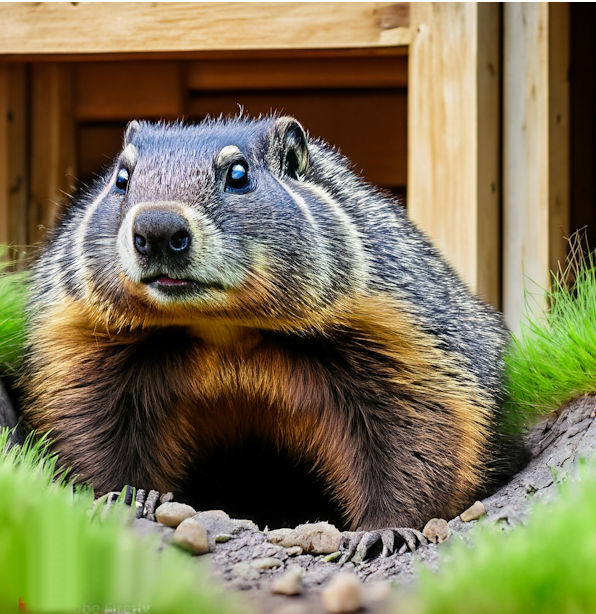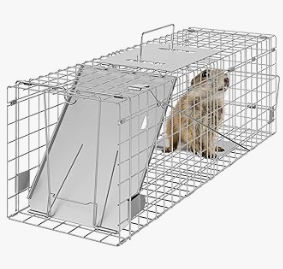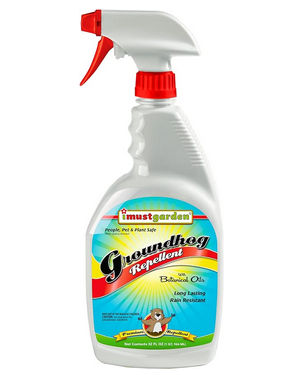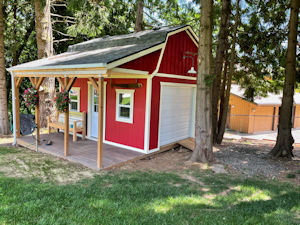Save 30% off Any Shed Plan Purchase!
Signup For My 'Shed n Sight' Newsletter
and Get Your 30% off Promo Code To Use At Checkout.
- Home
- Proper Shed Building Tips
- Got a groundhog problem?
Tips On How to get rid of groundhogs under your shed
 Here's Some Tips On How To Get Rid Of Groundhogs Under Your Shed
Here's Some Tips On How To Get Rid Of Groundhogs Under Your ShedEncountering a groundhog problem in your backyard is a familiar trouble that many property owners face, especially in North America. These large rodents can cause significant damage, from ravaging your vegetable garden to setting up residence under your shed, leading to potential structural damage. One would understandably need groundhog removal right away for such a big issue.
If you’re searching for the best way to get rid of groundhogs, you’ve landed at the right place. Here is a step-by-step process on how to safely and effectively handle your groundhog issue, employing several control techniques, humane methods, and natural deterrents available.
Follow these steps to get rid of groundhogs under your shed...
Step 1: Identify the Problem
Start by looking out for the signs of a groundhog’s burrow. They are typically found near man-made structures like sheds. Scratch marks, large hole, fresh vegetables missing from your garden, and an extensive network of tunnels are good indicators. The best time to look is in early spring or late winter when groundhogs emerge from hibernation.
I have a few links to Amazon of which I am an affiliate. If you make a purchase from any of these links I will make a small commission. However this will not affect the price you pay at Amazon for any of these products.
Step 2: Check Local Laws
Before you begin any groundhog control methods, it’s crucial to familiarize yourself with local laws regarding trapping and relocating wild animals. Groundhogs are considered pest animals, but regulations may vary across different USA locations, so it’s best to check your local regulations first.
Step 3: Live Trapping
One of the most effective and humane methods is live trapping. Hardware stores most often sell cage traps specifically designed for large rodents like groundhogs. Be sure to wear gloves when setting the trap to avoid transferring any human scent. Place the cage trap near the burrow entrance. Fresh vegetables make great bait.
Step 4: One-Way Exclusion Door
Another humane trap method is to install a one-way exclusion door at the entrance of the burrow. This device allows the groundhog to exit its burrow but prevents it from reentering. Again, this method should only be used if your local laws permit.
Step 5: Fencing
An excellent preventive measure is to install a steel mesh fence or chicken wire around the base of your shed and vegetable garden. In-ground fencing is a good option, as groundhogs are skilled diggers. Adding hardware cloth or wire mesh underground can help deter them.
Step 6: Natural Repellents
There are several natural repellent solutions available. Epsom salt and talcum powder sprinkled around the entrances to their tunnels annoy groundhogs and might push them to relocate. A spray bottle mixture containing cayenne pepper, garlic, and water sprayed around your garden can be an effective solution.
Step 7: Essential Oils
Applying essential oils, such as peppermint oil, around the entrance of their burrow can act as a strong-smelling deterrent. Or, mix parts water with a couple of tablespoons of essential oils in a spray bottle.
Step 8: Home Remedies
Certain home remedies can work as scare tactics. Used kitty litter, dog urine, or blood meal spread around the burrow entrance can deter groundhogs. The smell of castor oil is another significant deterrent for groundhogs. Agricultural lime also creates a barrier that burns the groundhog’s feet.
Step 9: Commercial Repellents
Commercial chemical repellents can be purchased at most hardware stores. These range from granules to sprays and generally produce a strong odor that groundhogs dislike. One of the most common ways to deter these whistle pigs is to use a groundhog repellent.
Step 10: Professional Pest Control
If the groundhog infestation becomes too much to handle, contact a professional pest control agency, like Prudential Pest Solutions. Prices - updated with a visit to their home page - for professional services may vary based on the size of the infestation and the complexity of removal.
Groundhogs are well adapted to life underground!
Remember, groundhogs, also known as whistle pigs, are well-adapted to life underground. Their sharp claws and strong limbs make them excellent diggers. Thus, when you see tunnel entrances or burrow holes, simplification is crucial. Do not overlook the complexity of these creatures and their extensive tunnel systems.
Where live trapping and one-way doors are effective methods, complementing this with natural or commercial repellents can amplify their efficacy. Epsom salt is an easily accessible tool, and if you have pets, dog urine happens to act as a great deterrent!
Groundhogs cause a groundhog problem by burrowing under sheds, leaving owners to deal with massive holes and the potential for serious structural damage. However, there are several ways to get rid of groundhogs under your shed.
While it may seem overwhelming, remember that you have various options to choose from. With time and consistent efforts, you can reclaim your space and get back to enjoying your garden shed. Irrespective of whether you have one groundhog or a whole litter of them, rest assured, where there is a will and a shed, there is always a way!
Monthly DIY
Shed-in-sight
Newsletter
Subscribing will get you discounts on shed plans, monthly updates, new shed design ideas, tips, exclusive discounts on shed building resources and tools. Learn more here.
Recent Articles
-
Shed Plans For Building a 16x20 Barn Shed
Mar 03, 26 10:32 AM
Plans for building a 16x20 barn shed -
3d 10x12 Gambrel Shed Plans
Feb 26, 26 09:30 PM
Use these detailed 10x12 gambrel shed plans to build a storage shed, workshop shed, chicken coop and more. Building guide, materials list, email support. -
Quail habitat
Feb 16, 26 07:01 AM
I am building a quail habitat. I need a roof, and I am using treated 4x4 as a base for the shed, with wire cloth running under the 4x4 and attaching it
My You Tube Videos











